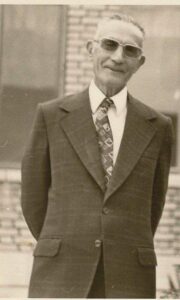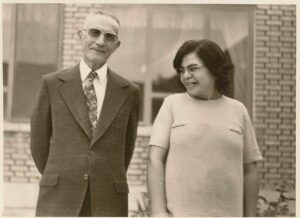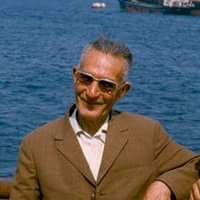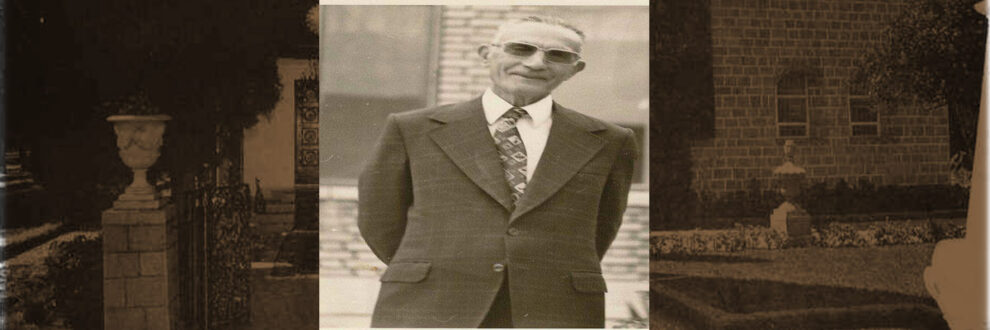 Reza Firouzi/ Rida Firuzi
Reza Firouzi/ Rida Firuzi
Born: 1906
Death: November 11, 1980
Place of Birth: Ahar, Arasbaran, Iran
Location of Death: Tabriz Prison, Tabriz, Iran
Burial Location: Vadi-e Rahmat section in Tabriz cemetery, Tabriz, Iran
Over 35 years ago, a man in his seventies walked into a prison cell and waited. The man named Reza was not there because he had committed a crime according to the political group in power. That group called itself the religious authority of the nation and propagated its messages at Friday prayers and from the pulpits to classrooms, in offices and at public rallies.
Reza’s son, Parviz, had been arrested not long before and the two now shared the same prison, if not the same room. Reza Fírúzí was a gentleman in every sense of the word. He was honest, hardworking, self-taught, a dedicated husband, courteous, upright and moral and a very good father. It was not his actual life that was the crime, because no one could fault him for any part of it. It was just that years earlier, he had asked questions and investigated the truth and come to believe in the Bahá’í Faith.
During his arrest, he was still actively participating in Bahá’í activities when the country had a revolution that did away with its king and replaced it with a Muslim cleric and politician whose speeches impassioned people to violence.
Reza’s home was confiscated and his wife and youngest son Jamshid were forced to leave. Jamshid’s  sisters were married and already living with their husbands and children overseas so Maryam and Jamshid moved in with Parviz’s wife Kianeah Mahlooji Firouzi and her children.
sisters were married and already living with their husbands and children overseas so Maryam and Jamshid moved in with Parviz’s wife Kianeah Mahlooji Firouzi and her children.
In prison, Reza was continuously pressured to recant his faith but he would not give his interrogators what they wanted and eventually forfeited his life instead of his faith. As the shots were fired that took his last breath his granddaughter Nooshin breathed for the first time and opened her eyes. Her eyes opened to her African American father and Iranian American mother in a country where the Baha’i teachings promise is destined to lead the world in overcoming prejudice and racism, but not before going through untold toil and suffering in the process.
After their decision to marry, Reza had written his son-in-law, Jim, a glorious letter about the family he had himself married into. About how special his wife, Maryam, Jim’s mother-in-law, was. About the man her father Mirza Haydar Alí-i Uskú’í had been. Reza had welcomed the couple with a wide embrace when they had visited Iran on their engagement, and praised them for living up to the spirit of the Bahá’í teaching of race unity in spite of what they were sure to experience back home in the United States.
 I was so proud when my aunt showed me that letter. A man who had never left Iran recognized Jim’s nobility and treated him with respect when his own countrymen would kill him out of prejudice (both of theirs). It’s all the more painful when you know someone was so decent that their life was used as a bargaining chip. But Reza with a smile in his heart bid his earthly life farewell and lifted his sights to higher things like truth and honor and goodness, things such as unconditional love, which were the ideals his faith promoted above other ideals.
I was so proud when my aunt showed me that letter. A man who had never left Iran recognized Jim’s nobility and treated him with respect when his own countrymen would kill him out of prejudice (both of theirs). It’s all the more painful when you know someone was so decent that their life was used as a bargaining chip. But Reza with a smile in his heart bid his earthly life farewell and lifted his sights to higher things like truth and honor and goodness, things such as unconditional love, which were the ideals his faith promoted above other ideals.
His son Parviz seemed to have the same idea, and reaching for his own truth one day in July, turned and faced the bullets that pierced his head and chest. These are my first heroes. The memory of their characters instructs me like a father and grandfather; the knowledge of their eternal presence warns me; the feeling of their love embraces me every time I turn to them. I just hope that when you think of someone amazing who isn’t physically present you understand that it’s only temporary, that you must go on because you have a purpose or two to fulfill, or at least that your life is richer for knowing them, and that, in thinking this, you feel comforted.
Editor’s Note:
Mr. Reza Firouzi’s father’s name was Haji Hasan and his mother was named Khanum. The dates of birth and names were received from Mrs. Firoozeh Sturdivant and Mr. Jamshid Firouzi. Ms. Farinaz Firouzi is the younger of Dr. Parviz Firouzi’s children who was two when her grandfather, Mr. Reza Firouzi, was imprisoned and executed and when her father, Dr. Parviz Firouzi, was imprisoned. Three years after his execution her mother, Mrs. Kianeah Mahlooji Firouzi, and uncle, Mr. Jamshid Firouzi, were imprisoned for ten months while her paternal grandmother, Mrs. Maryam Saniei, looked after her and her older brother, Kiarash. Farinaz remembered their subsequent journey from Iran through Pakistan and Austria to the US with their mother, uncle, and grandmother and began recounting it years later in her fifth grade compositions. But her information about the events that started her family on their journey remained limited until she came across the account by her mother, Mrs. Kianeah Mahlooji, of the arrest and execution of Dr. Faramarz Samandari, a close family friend and of her husband and father-in-law. Farinaz found the story as she searched for documents to supply biolographical information when requesting to offer a period of service at the Baha’i World Center in Haifa, Israel. To her surprise, on multiple occasions her period of service brought her in touch with Baha’i pilgrims who had known her father and were able to help her get to know him better through their recollections. Her grandfather, Reza, whom she remembered from her early years, was frequently remembered in anecdotes related by her mother, aunts and uncles, grandmother, great aunts and uncles, stories that offered a glimpse into his character. But that time in Haifa had also acquainted her with stories of countless others, stories of courage and faith from both the past and the present that remain to be told.
Source:
Interviews with Mrs. Faegheh Naraghi Firouzi and Mrs. Firouzi
Images:
Courtesy of Farinaz Firouzi








Praise be to God that we have such distinguished Baha’is in our History.